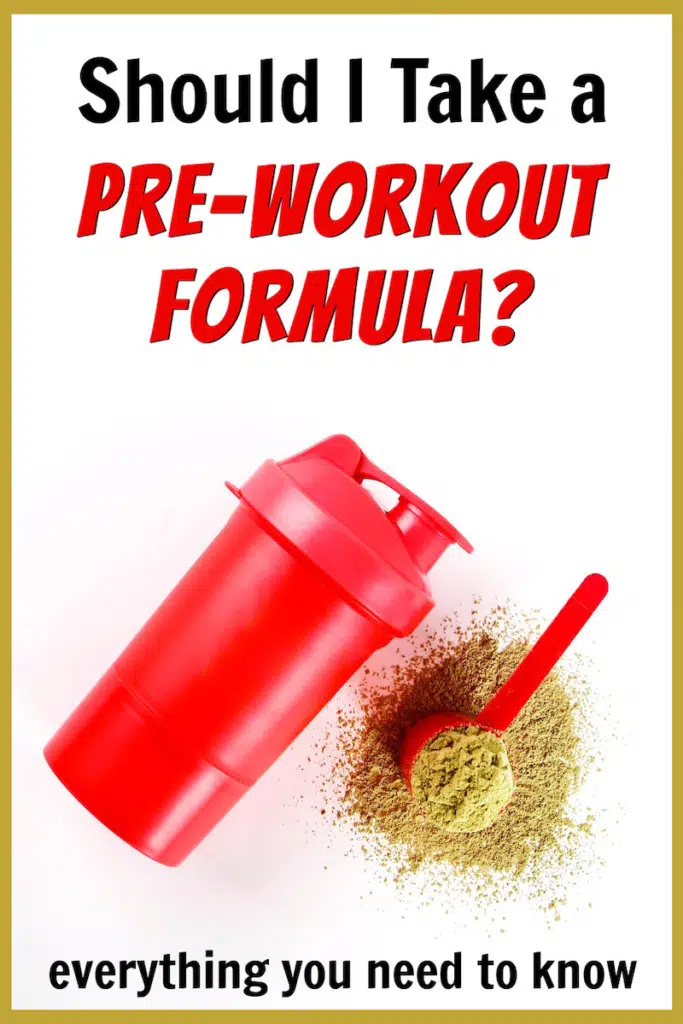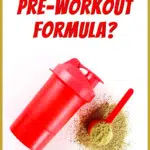Knowing whether or not to use a pre-workout formula is a crucial aspect of getting into shape.
Discover the benefits of pre-workout supplements, timing tips, and how to maximize your performance. Is it right for you? Find out below.
Complete Guide to Pre-Workout – Why to Use and What to Expect
What follows is your complete guide to pre-workout. This article helps you determine if pre-workout is an intelligent choice for you, how to get the most performance and benefits from your pre-workout, how long pre-workout lasts, and how to avoid the itching or tingling that can accompany pre-workout.
Additionally, there are specific health considerations you’ll need to understand fully before trying pre-workout, which are outlined below.
Pre-workout is a supplement – usually a loose-powder formula that you mix in water – taken to improve athletic performance.
Pre-workout formulas are for men or women and typically contain key ingredients to enhance energy levels, mental focus, physical performance, and recovery.
Right up front, it’s important to know that pre-workout formulas come in two types – with stimulants or stimulant-free.
Do Pre-Workout Formulas Work and Are They Worth the Cost?
As someone who has been training consistently and aggressively for decades, I can report anecdotally that pre-workout makes an unquestionable difference in my performance and results.

Many of my athlete friends report similar findings: pre-workout can be effective.
Pre-workout may or may not be worth the cost, depending on your priorities and budget. Fortunately, a broad selection of formulas is available at a full range of price points.
Personally, I choose formulas that are free of caffeine.
Though caffeine can be an excellent sports supplement when used strategically, I already drink 3 cups of caffeine-containing drinks daily – 1 small cup of coffee, one black tea, and one green tea.
I do this because research (see sources below this article) has established that the antioxidant content of these three beverages, when combined, forms a nutritional powerhouse.
Therefore, in my case, adding more caffeine would add little benefit and might even be detrimental to my central nervous system.
How Long Does Pre-Workout Last?
Pre-workout is designed to enhance your performance and give you an energy boost, so taking it at the right time is essential.
The effects of pre-workout can last approximately 5 hours, so if your formula contains caffeine, you might not want to consume it too close to your bedtime.
When Should I Take My Pre-Workout?
Many find it helpful to mix and drink their formula 30 minutes before they begin their workout. This gives the body time to absorb the ingredients.

If you are a mature athlete over the age of fifty, your warm-up and mobility drills might take approximately 30 minutes – in which case drinking it upon arriving at the gym could make the most sense.
Tips for Taking Pre-Workout
Here are a few tips to help you make the most of your formula:
- Take the supplement 30 minutes before your workout.
- Make sure you are adequately hydrated before taking a pre-workout.
- Begin with a lower dose to see how your body reacts.
- Be aware of the ingredients in your formula and how they may affect you.
Pros and Cons of Pre-Workout: How to Make the Most of It Without the Negative Effects
Side effects from taking pre-workout supplements are typically mild and may include:
- nausea
- dizziness
- headaches
- jitters
- increased heart rate
- anxiety
- itching or tingling (more on this below)
- stomach discomfort
- cold sores (more on this below).
In theory, taking a stimulant before a workout could increase the likelihood of injury if it muddles your thinking and affects your ability to make good choices while exercising. For instance, if you were to try a heavy lift that is beyond the current capability of your muscles, breathing capacity, ligaments, or joints.
How to Get Rid of Pre-Workout Itch or Tingling
Do you get an itchy feeling after using a pre-workout?
If so, you’re not alone.
Many people experience this sensation, which is known as pre-workout tingling. It can last 30 minutes or so. While it’s not usually dangerous, it can feel irksome.
Beta-alanine is a common (and otherwise helpful) ingredient in pre-workout formulas that may result in an unusual skin sensitivity commonly characterized as stinging, swelling, itching, or tingling.
But these feelings aren’t technically an itch; they are more like a dose-induced flush.
Doctors sometimes refer to this as paresthesia. The beta-alanine appears to activate the G-protein coupled receptor in the sensory nerve. Nicotine can also cause this sensation.
Beta-alanine is one of the most heavily studied performance-enhancing supplements, and the results are consistent. It’s a non-essential amino acid that assists in the production of carnosine, a protein building-block found in muscles that helps reduce fatigue and improve endurance.
Arginine is an amino acid that, if ingested in too heavy a dosage, can stimulate the herpes simplex virus.
Since the virus requires arginine to replicate and thrive within the body, going overboard on this amino acid can give you a flare-up or cold sore if the virus is already in your body (there are eight different kinds of the virus in humans, and over two-thirds of the world’s population under 50 has Type 1; it is common).
Arginine isn’t bad, but some pre-workout formulas contain too much.
Fortunately, lysine is an amino acid that can help counteract the adverse effects of arginine over-dosing.
So, if you think you’ve overeaten arginine – either within a supplement or in a high-arginine-containing snack with an overabundance of nuts or seeds (which are naturally high in arginine) – swallowing a simple lysine capsule can be useful. Ask your doctor.
If you’re experiencing pre-workout tingling, look at the ingredients list of your supplement and see if anything stands out as a potential trigger. You may need to switch to a different brand or formula that doesn’t contain the same irritants. Or, simply reduce the dosage.
Talking to your doctor can help you rule out any underlying medical conditions and guide you on dealing with itchiness or tingling.
How to Make the Most of a Pre-Workout Supplement
To make the most of your pre-workout supplement, consider:
- Choosing a formula that contains ingredients that match your goals.
- Starting with a small dose to assess your tolerance.
- Increasing the dose gradually over time.
- Possibly stacking your pre-workout with other supplements, such as whey isolate protein powder, for best results.
- Possibly taking your pre-workout on an empty stomach for maximum absorption, if that feels okay.
If you believe that your formula is wearing off before the end of your training session, you can increase the dose gradually over time.
Active Ingredients within Many Pre-Workout Formulas
Here are some of the ingredients contained within typical pre-workout formulas. They may or may not be helpful to you.
Caffeine and Nitric Oxide
Caffeine is a stimulant that can assist you in feeling more energized, while nitric oxide is a vasodilator that can improve blood flow and deliver more nutrients to working muscles.
Amino Acids and Creatine
Amino acids provide the building blocks for muscle growth, while creatine is an extremely well-studied energy source that helps mitigate muscle fatigue (just don’t take so much of it that you exhaust your kidneys).
Beta-Alanine and Sodium Bicarbonate
As discussed above, beta-alanine is an amino acid that aids in carnosine production and helps reduce fatigue and improve endurance. Sodium bicarbonate negates the full effects of acidosis, which can impair muscular performance.
Citrulline
Supplementing with citrulline malate is a more effective way of raising blood arginine levels than supplementing with arginine. Research indicates it helps improve exercise performance by helping clear out the ammonia that builds up during exercise through the urea cycle.
Examples of Pre-Workout Brands
Though I’m not affiliated with LabDoor, I recommend them because they objectively analyze various formulas within their lab to see if the ingredients the companies have listed on their labels are actually inside their products. They rank the formulas based on quality (see sources list at bottom of this article).
No Dry Scooping! Pre-Workout Supplement Safety
Pre-workout formulas are generally safe to take. However, there are a few safety considerations to keep in mind:
- Do not take if you are pregnant or breastfeeding.
- Do not take if you have any medical conditions, such as high blood pressure or heart disease.
- Do not take if you are taking any medications.
- Do not take it if you are under the age of 18.
- If you experience any adverse side effects, stop taking the supplement and consult a healthcare professional.
One unfortunate recent trend saw many people dry scooping pre-workout powder in their gyms without water. That means they were putting a scoop of powder directly into their mouths without diluting it in water first.
This is not advised.
There is a reason that the label instructs to dissolve the product into the water before ingesting it. The dilution ensures that you’re getting a more accurate and time-released dosage. By dry scooping, you risk having to visit the Emergency Room of your local hospital.
The Bottom Line on Pre-Workouts
Pre-workout formulas can improve exercise performance by increasing energy levels, enhancing mental focus, delaying muscle tiredness, improving blood flow – giving you “a pump” – and providing the building blocks for muscular repair and growth. However, they’re not for everyone, and some brands are better than others.
Additional Resources on Pre-Workout Formulas and their Ingredients:
LabDoor Objective Testing – https://labdoor.com/rankings/pre-workout
Tea and Coffee Together Reduce Risk of Stroke and Dementia – https://bihealthservices.com/2021/12/04/interesting-study-between-tea-and-coffee-lowering-the-risk-of-stroke/
Safety Precautions and Performance Outcomes of Pre-Workout: A Research Study – https://www.poison.org/-/media/files/pdf-for-article-dowloads-and-refs/harty-ps-et-al-multi-ingredient-pre-workout-supplements-safety-implications-and-performance-outcomes.pdf
Potential Benefits of Lysine – https://www.colgate.com/en-us/oral-health/mouth-sores-and-infections/lysine-for-cold-sores-does-it-work
On Overdoing Caffeine – https://www.fda.gov/consumers/consumer-updates/spilling-beans-how-much-caffeine-too-much
HSV-1 Is Common – https://www.who.int/news/item/28-10-2015-globally-an-estimated-two-thirds-of-the-population-under-50-are-infected-with-herpes-simplex-virus-type-1
Compelling Reasons to Ask Your Doctor Before Beginning a New Nutritional or Exercise Regimen – https://shop.truefitness.com/resources/the-importance-of-consulting-with-your-doctor-before-exercising/
